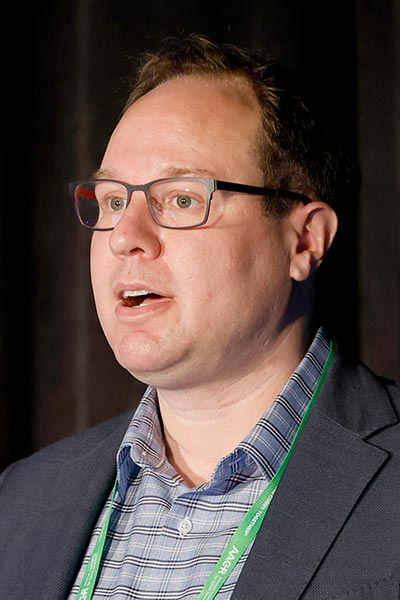AACR Project GENIE registry is building a wealth of data to help researchers decode cancer
The AACR’s Project GENIE (Genomics Evidence Neoplasia Information Exchange) celebrated its six-year anniversary in November 2021.

Project GENIE is a publicly accessible, international cancer registry of real-world data assembled through data-sharing between 19 of the leading cancer centers in the world. Several presentations at the AACR Annual Meeting 2022 feature projects that are using data from the registry to answer their important research questions.
“This speaks to how more and more people are using and aware of the information that is available through the GENIE registry,” said Philippe L. Bedard, MD, UHN Toronto General Hospital, Toronto, Canada.
On Sunday, April 10, Bedard chaired a special session at the Annual Meeting that included presentations from several projects describing how they’re using data from Project GENIE to decode the complexities of cancer. The session, Decoding Cancer Complexity and Transforming Patient Outcomes Using AACR Project GENIE, can be viewed on the virtual platform by registered meeting participants through July 13, 2022.

GENIE ancestry
Jian Carrot-Zhang, PhD, Dana-Farber Cancer Institute, opened the session with a discussion about the use of genetic ancestry to redefine the role of race and ethnicity in patient prognosis and outcomes.
Genetic or nongenetic differences between populations can lead to molecular subtypes with different somatic features, Carrot-Zhang explained. Examples of this include the presence of MYC amplification in prostate cancer from African Americans and enrichment for EGFR in East Asian and Latin American lung cancers.
“A lack of knowledge about somatic differences between populations is a major barrier to implementing precision medicine for underserved populations,” said Carrot-Zhang, noting that social determinants also play a role, with research showing that underserved populations are less likely to be tested for actionable mutations.
Race and ethnicity are not always reported or recorded in real-world settings, and—making things more complicated—the African American and Hispanic populations in the U.S. are admixed populations with mixed ancestries, Carrot-Zhang said.
To further explore the role of ancestry, Carrot-Zhang and colleagues developed a protocol to identify local ancestry and detect associated molecular changes. The researchers identified 165 ancestry-gene associations across 14 cancer types. However, they also wanted to investigate whether these ancestry-associated genes can explain outcome disparities.
In a collaboration with AACR Project GENIE, Carrot-Zhang and colleagues are looking at integrated, highly detailed clinical information together with somatic data from thousands of non-European patients. In some of their preliminary work, they have found that African ancestry and NF2 mutations are independently associated with overall survival from renal cell carcinoma, suggesting that NF2 mutation can at least partially explain outcome disparities.

BioPharma collaboration
Gregory J. Riely, MD, PhD, Memorial Sloan Kettering Cancer Center, walked session participants through the Biopharma Collaboration (BPC) non-small cell lung cancer (NSCLC) 2.0 public data release.
Project GENIE has incredibly rich genomic data with limited clinical information, Riely said. “The reason the GENIE BPC exists is to obtain clinical data that will allow us to explore how genomic findings translate into outcomes findings,” he explained.
The BPC is taking the clinical outcome data generated by GENIE and layering on demographic and patient-treatment information. This allows for a full picture of the patient’s disease journey, Riely said.
During the first phase of BPC, data from 1,873 patients with NSCLC has been gathered from four participating institutions. Using this powerful combination of data, Riely and colleagues are better able to understand how tumor mutations affect outcomes. For example, looking at the overall survival of patients with NSCLC treated with first-line platinum, they were able to ascertain that the presence of STK11 mutations was associated with inferior outcomes compared to patients without STK11 mutations.
Another data analysis compared second-line docetaxel to second-line checkpoint inhibitors and showed an overall survival difference of about three months between the two groups, which is similar to what was observed in randomized trials. These clinical data are representative of broad populations of patients with NSCLC and the outcomes were similar to those observed in contemporary clinical trials, Riely said.
The new NSCLC dataset will be publicly available this week. The subsequent release for different tumor types will occur on a rolling basis over the next two years.

RAS co-occurrences
Robert B. Scharpf, PhD, Sidney Kimmel Comprehensive Cancer Center at Johns Hopkins School of Medicine, discussed his research examining the role of RAS mutations in the course of NSCLC and colorectal cancer using Project GENIE data.
Scharpf and colleagues developed a joint model for prevalence of RAS hotspot variants across 51 cancer types in Project GENIE, and then modeled the co-occurrence of RAS with non-RAS variants. These co-occurrences with non-RAS variants can reflect processes of selection, Scharpf said.
The co-occurrence patterns can also have clinical implications. As an example, Scharpf shared the retrospective finding that overall survival among patients with NSCLC was worse among patients whose tumors had co-occurrence of KRAS G12C and STK11 mutations compared to those with only KRAS G12C mutations.
GENIE’s future
Bedard closed the session with some statistics about the AACR Project GENIE registry. To date, there have been 11 public data releases and more than 136,000 tumors sequenced from more than 120,000 patients. Available data reflect 110 major cancer types and 758 subtypes.
There are more than 605 citations of Project GENIE and the registry has contributed to the regulatory filing of the KRAS inhibitor sotorasib, which gained FDA approval in May last year to treat certain patients with KRAS G12C-mutated NSCLC.
But there is more work to be done, Bedard said. For example, it is recognized that the large proportion (83.4 percent) of data in the GENIE registry are from people who self-identify as White or Caucasian.
“This is not a unique problem to GENIE,” Bedard said. “One of the key priorities is to expand diversity within [the registry].”
To that end, AACR Project GENIE will issue an open call this year for new GENIE applicants focused on patient diversity, including race/ethnicity and rural populations. The BPC is also entering a planned phase 2 where it will focus on lung cancer, colorectal cancer, ovarian cancer, esophagogastric cancer, renal cell carcinoma, and cutaneous melanoma.
Bedard encouraged session participants interested in Project GENIE to access the data available through the AACR Project GENIE cBioPortal.
[sub-post-content]
